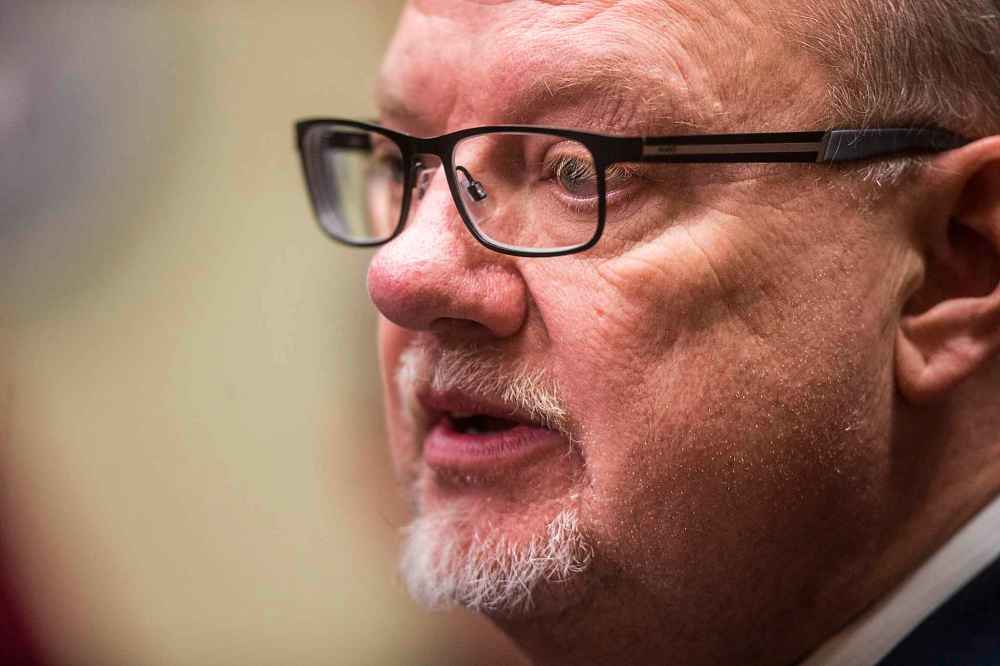Teachers work satisfaction slips in shadow of education review: poll
Read this article for free:
or
Already have an account? Log in here »
To continue reading, please subscribe:
Monthly Digital Subscription
$0 for the first 4 weeks*
- Enjoy unlimited reading on winnipegfreepress.com
- Read the E-Edition, our digital replica newspaper
- Access News Break, our award-winning app
- Play interactive puzzles
*No charge for 4 weeks then price increases to the regular rate of $19.00 plus GST every four weeks. Offer available to new and qualified returning subscribers only. Cancel any time.
Monthly Digital Subscription
$4.75/week*
- Enjoy unlimited reading on winnipegfreepress.com
- Read the E-Edition, our digital replica newspaper
- Access News Break, our award-winning app
- Play interactive puzzles
*Billed as $19 plus GST every four weeks. Cancel any time.
To continue reading, please subscribe:
Add Free Press access to your Brandon Sun subscription for only an additional
$1 for the first 4 weeks*
*Your next subscription payment will increase by $1.00 and you will be charged $16.99 plus GST for four weeks. After four weeks, your payment will increase to $23.99 plus GST every four weeks.
Read unlimited articles for free today:
or
Already have an account? Log in here »
Hey there, time traveller!
This article was published 19/02/2020 (2124 days ago), so information in it may no longer be current.
As Manitoba teachers brace for a massive overhaul of the public education system, they’re anxious to find out how classrooms will change — many say their jobs already have.
A new report commissioned by the Manitoba Teachers’ Society found 74 per cent of K-12 teachers feel the province is steering education onto the “wrong track,” while 16 per cent think it’s headed in the "right direction."
At the same time, six out of 10 public school teachers reported feeling their job had somewhat or significantly “worsened” since the Progressive Conservatives came to power in 2016.
The union undertakes a random poll of its membership annually to take the pulse of the public education system and Manitoba teachers’ place in it.
Conducted by Viewpoints Research, the 2019 edition surveyed 801 teachers from across the province between October and November — after Premier Brian Pallister’s re-election campaign, during which MTS paid for ads warning about Tory cuts.
Its margin of error is plus or minus three percentage points, 19 times out of 20.

!function(e,i,n,s){var t=”InfogramEmbeds”,d=e.getElementsByTagName(“script”)[0];if(window[t]&&window[t].initialized)window[t].process&&window[t].process();else if(!e.getElementById(n)){var o=e.createElement(“script”);o.async=1,o.id=n,o.src=”https://e.infogram.com/js/dist/embed-loader-min.js”,d.parentNode.insertBefore(o,d)}}(document,0,”infogram-async”);
“The responsibilities of a teacher are becoming more and more outside of teaching,” said Albert Krynski, a geography teacher in rural Manitoba and president of Portage Teachers’ Association.
“We’re looking at being social workers and dealing with more issues that occur outside of the classroom. We’re having to deal with students coming to school hungry or haven’t had a good night’s sleep.”
Krynski said his members in the Conservative stronghold of the Portage la Prairie riding are, overall, satisfied in their schools, but there’s no doubt teachers are being tasked with more work.
“We’re looking at being social workers and dealing with more issues that occur outside of the classroom. We’re having to deal with students coming to school hungry or haven’t had a good night’s sleep.”
– Albert Krynski president of Portage Teachers’ Association
Meanwhile, they’re doing so with less support, said MTS president James Bedford.
Bedford said he hears frequently about how the removal of the K-3 class-size cap and how provincial public education funding increases below inflation are affecting budgets and, in turn, leaving teachers feeling more stressed.
An overwhelming majority of teachers reported being satisfied at work in the latest survey, but that percentage — 84 per cent — is the lowest recorded, albeit, by a single percentage point. The percentage of teachers who reported being dissatisfied rose to a high of 16 per cent, a two per cent increase since 2018.

!function(e,i,n,s){var t=”InfogramEmbeds”,d=e.getElementsByTagName(“script”)[0];if(window[t]&&window[t].initialized)window[t].process&&window[t].process();else if(!e.getElementById(n)){var o=e.createElement(“script”);o.async=1,o.id=n,o.src=”https://e.infogram.com/js/dist/embed-loader-min.js”,d.parentNode.insertBefore(o,d)}}(document,0,”infogram-async”);
Common concerns raised include classroom diversity, class sizes and a lack of support or resources in the workplace, followed by workload, government cutbacks, and wage freezes.
“Teachers are a very important part of our education system, although all professions have aspects of their job that are demanding,” Education Minister Kelvin Goertzen said in a prepared statement.
Goertzen was not made available for an interview Wednesday.

In his statement, the minister noted teachers can earn upwards of $90,000 annually, on top of a “generous pension plan,” extended health coverage and 10 paid non-instructional days.
Also Wednesday, the minister touted the education review. Its impending results, he said, will ensure the system “focuses on achieving the best results for students.”
The largest inquiry of its kind in a half-century, the review has looked into everything from teachers’ roles to school division governance structures. The final report is scheduled to be made public in late March.
For the time being, Mary Chalmers said she and her colleagues are anxiously waiting, as they adapt to an evolving curriculum and students’ ever-changing social and emotional needs, with gaps in professional development.
“People want to know that their work is appreciated and maybe that’s a little bit of the problem right now,” said Chalmers, president of the Border Land Teachers’ Association, located in southeast Manitoba.
“Teachers are feeling like, ‘If things are going well in the province, why are we doing a review? Do parents, do students, do school divisions, do trustees appreciate the hard work we’re doing everyday?’”
maggie.macintosh@freepress.mb.ca
Twitter: @macintoshmaggie

Maggie Macintosh reports on education for the Winnipeg Free Press. Funding for the Free Press education reporter comes from the Government of Canada through the Local Journalism Initiative.
Our newsroom depends on a growing audience of readers to power our journalism. If you are not a paid reader, please consider becoming a subscriber.
Our newsroom depends on its audience of readers to power our journalism. Thank you for your support.








